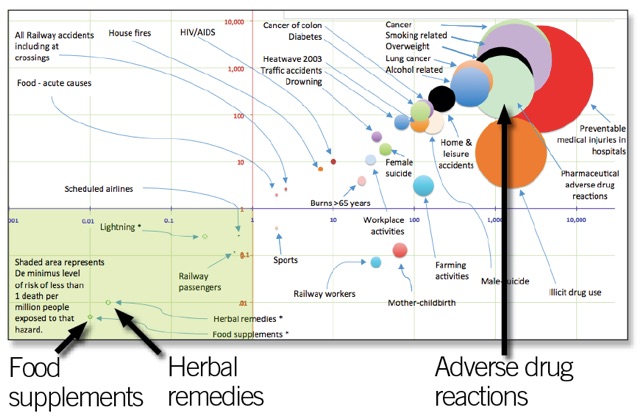

Article

Do vitamins kill people?
Of course not.
This would seem like common sense considering the body actually requires vitamins to function.
And experience tell us nutrients are extremely safe...
However published articles and media stories continue to appear – telling us vitamins and other nutients are dangerous or ineffective.
These articles and stories highlight why it is important to think critically about the information we receive.
This recently published article, for example, claimed that vitamin and mineral supplements are harmful:
Dietary Supplements and Mortality Rate in Older Women
The Iowa Women’s Health Study JAMA Internal Medicine
http://archinte.jamanetwork.com/article.aspx?articleid=1105975
The study looked at over 38,000 women over 22 years and came to the conclusion that the death rate was 6% higher in women who used vitamin and mineral supplements.
Was something wrong with the way the data was collected or interpreted?
What researchers did not do:
-
•give two identical people measured doses of supplements and see who lived longer.
Instead they:
-
•looked at thousands of women with many different attributes and lifestyle habits
-
•had them complete diet and supplement recall questionnaires – three times over 22 years
-
•adjusted the data to "balance" the differences between the women who did, and did not, take nutrional supplements.
In the study data results were adjusted for:
-
•education
-
•diabetes
-
•smoking
-
•exercise
-
•blood pressure
-
•food-energy consumed
Adjusting essentially works this way:
-
•“penalize” the group who do health-promoting things like exercise – by decreasing their life-expectancy score
and/or
-
•“reward” the group who do health-defeating things like smoking – by increasing their life-expectancy score
By doing this type of adjusting, the study authors believed they were essentially just comparing supplement- vs non-supplement use results.
Of course whenever data is adjusted there is the potential for over-adjustment.
It needs to be pointed out that the minimally adjusted data in the study showed that use of nutritional supplements significantly INCREASED, NOT DECREASED, life-expectancy.
“adjusted for age and energy intake, self-reported use of vitamin B complex; vitamins C, D, and E; and calcium had significantly lower risk of total mortality compared with nonuse”
It was also stated in the second-last paragraph of the article that the findings were not good enough to make any conclusions...
“It is not advisable to make a causal statement of excess risk based on these observational data.”
BUT the media reported only the part about
multivitamins decreasing life-expectancy.
This raises some critical thinking questions...
Why would the authors even publish the article when they themselves stated the data should not be used to draw conclusions?
Why would the media only report the negative result and ignore the positive result regarding multivitamin use?
For more in-depth thinking on this, check out:
Designed to fail: a trial without meaning
http://www.anh-usa.org/designed-to-fail-a-trial-without-meaning/
Large-scale study brings good and bad results for multivitamins
http://anh-europe.org/Large+scale+study+brings+good+and+bad+results+for+multivitamins
Dangerous vitamins vs safe medications?
There seems to be an underlying belief among people that supplements and natural products are inherently dangerous, and medications are inherently safe.
However...
No deaths due to supplements.
“There was not even one death caused by a dietary supplement in 2008, according to the most recent information collected by the U.S. National Poison Data System.”
No Deaths from Vitamins, Minerals, Amino Acids or Herbs – Poison Control Statistics Prove Supplements’ Safety
http://orthomolecular.org/resources/omns/v06n04.shtml
Food supplements and herbal remedies are safer than medications.
Dot size indicates degree of risk.
CLICK HERE for the full-sized diagram.
Societal vs Individual Risk of Death in Europe
http://anh-europe.org/sites/default/files/EU_Bubbles_Graph_2012_9_July.pdf
Medication use needs to be weighed against the potential risks.
For example:
Non-Steroidal Anti-inflammatory drugs (NSAIDs)
These medications reduce inflammation but...
“at least 16,500 NSAID-related deaths occur each year among arthritis patients alone.” (in the U.S.)
Am J Med. 1998 Jul 27;105(1B):31S-38S.
Recent considerations in nonsteroidal anti-inflammatory drug gastropathy. Singh G
http://www.ncbi.nlm.nih.gov/pubmed/9715832
Tamoxifen
For every 1000 women on Tamoxifen:
-
•9 cases of breast cancer will be prevented
BUT the drug treatment would likely cause:
-
•21 cases of endometrial cancer
-
•21 cases involving blood clots
-
•31 cases of cataracts
Number Needed to Treat, A Practical Measure of Drug Effectiveness
http://nnt-label.info/index.html
Contradictory information necessitates critical thinking.
Not everything about the medical system approach is valid or invalid.
Neither is everything regarding nutrition, diet, and natural health valid or invalid.
Critical thinking helps people evalutate contradictory or invalid information, so they can make INFORMED DECISIONS about their health and treatments.
Why people don't think critically when it comes to their health:
-
•it doesn't occur to them that they should
-
•they don’t think they need to (i.e. "no one wants to take advantage of me")
they don’t know how (it is a learnable skill – I got my start from a University course)
Key critical thinking questions...
Some of the questions I keep in mind when I work with clients or evaluate health and nutrition information include:
-
•does this make sense based on what I already know?
-
•does this fit with what humans have been doing for the last 10,000 years?
-
•is this information backed up by my knowledge of anatomy and physiology?
-
•how will I know if this course of action is working or not working?
-
•is there proof this (whatever) is true?
-
•does someone stand to make a lot of money from this?
-
•does someone stand to gain control or power from this?
Check this out:
Why Most Published Research Findings Are False
John P. A. Ioannidis, PLOS | Medicine
http://www.plosmedicine.org/article/info:doi/10.1371/journal.pmed.0020124
How to be a better critical thinker:
-
•Consciously think about the validity of the information you are exposed to or working with
-
•Read this article:
The Importance of Logic and Critical Thinking, Curtis Silver 03.10.11
http://www.wired.com/geekdad/2011/03/the-importance-of-logic-critical-thinking/
-
•Google: "critical thinking", "critical thinking skills"
-
•Read books on critical thinking.
For example:
Asking the Right Questions: A Guide to Critical Thinking
by M. Neil Browne
Being Logical: A Guide to Good Thinking
by D.Q. McInerny
Critical Thinking for Students
by Roy van den Brink-Budgen
-
•Take courses on critical thinking. These are offered at many universities, colleges, and institutions.
Home | Holistic Nutrition | Talks and workshops | Contact | Articles and recipes

© 2020 Paul Demeda | 2869 Bloor Street West | Toronto, ON M8X 1B3, Canada

